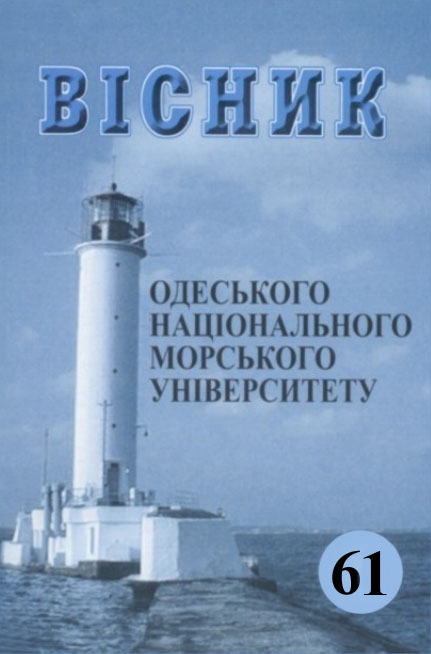Regeneration of operational properties of marine diesel engine oils
Main Article Content
Abstract
It is noted that the operation of marine internal combustion engines provides continuous and periodic monitoring not only of the indicators that characterize the duty cycle of the diesel (pressure and temperature at characteristic points, speed, power, exhaust gas temperature), but also the operational and rheological characteristics of engine oil. The main parameters of engine oil, the control of which is mandatory during the operation of the diesel engine are: viscosity, density, acid number, flash point, water content and mechanical impurities. It is stated that due to the increase of pressure and temperature of the duty cycle, increase of torque, change of design, complication of operating conditions, increase of the working time of modern diesels at maximum loads, the operating conditions of oils in lubricating and circulating lubrication systems have become more stringent. Therefore, it is urgent to solve the problem of regeneration of the operational characteristics of the oil during its operation. Considering the above, the issues of regeneration of operational properties (viscosity, acid number, density) of motor oils used in circulating lubrication systems of marine diesel engines are considered. The results of experimental studies to determine the change in these parameters, as well as the rheological resistance of Castrol TPL 203 engine oil during its operation in the circulating lubrication system of the ship medium-speed diesel engine 6EY22AW of Yanmar. According to the results of experimental studies, it is proved that the most effective way of regenerating the performance of engine oil is to reduce the time of adding oil to the total volume of the lubrication system with the simultaneous use of surfactants. It is established that the reduction of the time of replenishment of the volume of oil in the circulatory system contributes to a slower deviation of its basic qualitative indicators from the base value (above all the viscosity, which increases by 11,76 % when changing the intensity of addition from 100 to 25 hours). Reducing the time to replenish the volume of oil in the circulation system to 10 hours with the simultaneous use of surface-active additives provides an increase in viscosity by 3,92 % while maintaining other indicators (rheological resistance, density and acid number) in the range of recommended and possible values.
Article Details
References
2. Sagin S.V., Zablotsky Yu.V. (2012) Vliyanie anizotropnyh zhidkostej na rabotu uzlov treniya sudovyh dizelej [The effect of anisotropic fluids on the operation of friction units of marine diesel engines]. Problemy texniky: naukovo-vyrobnychj zhurnal, no. 4, pp. 68-81.
3. Sagin S.V., Matskevich D.V. (2011). Opticheskie harakteristiki granichnyh smazochnyh sloev masel, primenyaemyh v cirkulyacionnyh sistemah sudovyh dizelej [Optical characteristics of boundary lubricating layers of oils used in marine diesel circulating systems]. Sudovye energeticheskie ustanovki: nauchno-tehnicheskij sbornik, no. 26, pp. 116-125.
4. Sagin S.V., Solodovnikov V.G. (2017) Estimation of Operational Properties of Lubricant Coolant Liquids by Optical Methods. International Journal of Applied Engineering Research, vol. 12, no. 19, pp. 8380-8391.
5. Popovskii A.Yu., Sagin S.V. (2016) Ocenka ekspluatacionnyh svojstv smazochno-ohlazhdayushih zhidkostej sudovyh tehnicheskih sredstv [Evalua-tion of the operational properties of cutting fluids of marine technical equipment]. Avtomatizaciya sudovyh tehnicheskih sredstv: nauchno-teh-nicheskij sbornik, no. 22, pp. 66-74.
6. Sagin S.V., Zablotsky Yu.V. (2011) Opredelenie tribotehnicheskih harakteristik poverhnostej po stepeni uporyadochennosti pri-stennyh sloev uglevodorodnyh zhidkostej [Determination of tribological characteristics of surfaces according to the degree of ordering of wall layers of hydrocarbon fluids]. Problemy texniky: naukovo-vyrobnychj zhurnal, no. 3, pp. 78-88.
7. Matskevich D.V., Sagin S.V. (2012). Diagnostirovanie strukturnogo sostoyaniya uglevodorodnyh zhidkostej po ih elektricheskoj prochnosti [Diagnosis of the structural state of hydrocarbon fluids by their electric strength]. Problemy texniky: naukovo-vyrobnychj zhurnal, no. 2, pp. 38-46.
8. Zablotsky Yu.V., Sagin S.V. (2016) Maintaining Boundary and Hydrodynamic Lubrication Modes in Operating High-pressure Fuel Injection Pumps of Marine Diesel Engines. Indian Journal of Science and Technology, vol. 9, no. 20, pp. 208-216. DOI 10.17485/ijst/2016/v9i20/94490.
9. Sagin S.V., Semenov O.V. (2016) Marine Slow-Speed Diesel Engine Diagnosis with View to Cylinder Oil Specification. American Journal of Applied Sciences, vol. 13, no. 5, pp. 618-627. DOI 10.3844/ajassp. 2016.618.627.
10. Zablotsky Yu.V., Sagin S.V. (2016) Enhancing Fuel Efficiency and Environmental Specifications of a Marine Diesel When using Fuel Additives. Indian Journal of Science and Technology, vol. 9, no. 46, pp. 353-362. DOI 10.17485/ijst/2016/v9i46/107516.
